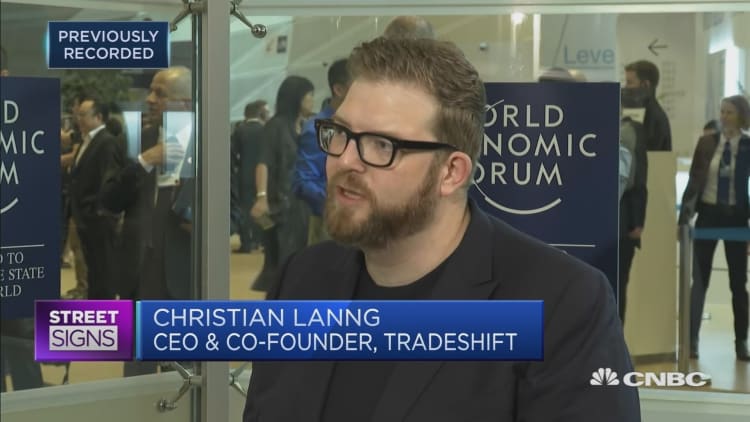
While tensions between Washington and Beijing have slowed trading activity globally, it'll take many more years for existing supply chains to be shifted away from China, according to the co-founder of Tradeshift, a business commerce platform.
The U.S. and China have been embroiled in a year-long trade conflict that has resulted in elevated tariffs on hundreds of billions of dollars in goods that the two countries trade.
According to the International Monetary Fund, the volume of goods traded globally grew 3.9% in 2018 — the year that the U.S.-China tariff fight started. That's down from 5.6% the previous year.
But shipments of goods in and out of China have largely been "unabated," Christian Lanng, chief executive and co-founder of Tradeshift, told CNBC's Geoff Cutmore and Arjun Kharpal on Tuesday at the World Economic Forum in Dalian, China.
"There's a little bit of a slow down," he said.
Lanng said, however, Vietnam's trade with China went up $4.7 billion. "So I think trade will find a way and then these flows will continue."
Tradeshift helps businesses send invoices and make payments using technology across their supply chains, so the company has insights into how trade flows have shifted, if any, in reaction to tensions between the world's top two economies.
Lanng said given that "it took around 30 years to establish the global supply chains" that are up and running currently, it'll take "a lot longer" than one year to unwind those networks.
Vietnam and other Southeast Asian economies are frequently cited as alternative locations for China-based manufacturers wanting to circumvent elevated tariffs imposed by the U.S. Even before tensions between Washington and Beijing escalated, several global companies such as Nike and Adidas had already set up manufacturing facilities in Vietnam due in part to growing wages in China.
With the trade war drawing greater attention to Vietnam, some experts have questioned whether the Southeast Asian country has the infrastructure needed to replace China as the world's manufacturing center.
'Healthy skepticism' on blockchain
The CEO said previously that blockchain technology is not yet mature enough to fully support the global supply chain. On Tuesday, he said he maintains a "healthy skepticism" on the hype around the technology and wouldn't jump into adopting it into his business immediately.
When asked for his views on Facebook's plan to create a new digital currency called Libra, Lanng reiterated his stance that the social media giant should first focus on establishing trust with its users.
He noted that Facebook once introduced payments services on its messaging platform, but "it went nowhere." He questioned whether users would take to Libra, which is potentially more complicated to understand and use.
"If you really want to be a player in stable coins or currencies of any kind, it's about trust. If you were to rank consumer trust in brands right now in the U.S., I'm not sure Facebook will be very high on that list," said the CEO.


